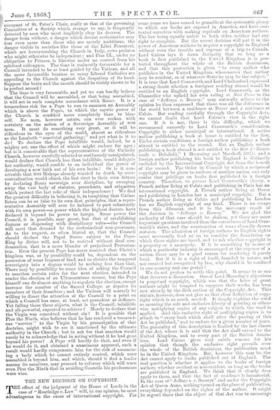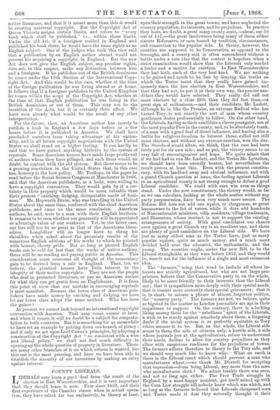THE NEW DECISION ON COPYRIGHT.
THE effect of the judgment of the House of Lords in the case of " Routledge v. Low " will, in our opinion, be most advantageous to the cause of international copyright. For
occupant of St. Peter's Chair, really at that of the governing some years we have ceased to grumble at the systematic piracy
to which our books are exposed in America, and have con- tented ourselves with making reprisals on American authors. The law being equally unfair to both sides, neither had any right to complain. But the recent decision will put it in the power of American authors to acquire a copyright in England without even the trouble and expense of a trip to Canada. Lord Cairns lays it down distinctly that so long as a book is first published in the United Kingdom it is pro- tected throughout the whole of the British dominions, and that this protection is given " to every author who publishes in the United Kingdom, wheresoever that author may be resident, or of whatever State he may be the subject." It is true that Lord Cranworth and Lord Chelmsford expressed a strong doubt whether a foreigner residing abroad would be entitled to an English copyright. Lord Cranworth, as the Chancellor who upheld his own ruling at Nisi Prins in the case of "Jefferys v. Boosey," may naturally adhere to the opinion he then expressed that there was all the difference in the' world between a residence at Dover and a residence at Calais. But reading carefully through the Copyright Acts, we cannot doubt that Lord Cairns's view is the right one. If it is not, there is this difficulty, which wo recommend earnestly to Lord Cranworth's consideration. Copyright is either municipal or international. A native author publishing a book at home is entitled to the first. Under certain conditions, a foreign author publishing a book abroad is entitled to the second. But an English author publishing a book abroad is not entitled to the first (" Bouci- cault v. Delafield," 1 Hemming and Marshall, 507); and a foreign author publishing his book in England is distinctly excluded by the International Copyright Act from the benefit of the second. The Order in Council by which a reciprocal copyright may be given to authors of another nation, can only confer that privilege on books first published in a foreign country. Therefore, to pursue Lord Cranworth's theory, a French author living at Calais and publishing in Paris has an international copyright. A French author living at Dover and publishing in London has a municipal copyright. But a French author living at Calais and publishing in London has no English copyright of any kind. There is no escape from this dilemma, and it is the necessary result of the decision in "Jefferys v. Boosey." Wo are glad the authority of that case should be shaken, yet there are more important questions involved than the correctness of Lord Cran- worth's views, and the construction of seine clumsily drawn statutes. The admission of foreign authors to English rights must necessarily lead us on to consider the foundation on which those rights are based, and to ask whether copyright is a property or a monopoly. If it is something by means of which a particular industry is encouraged at the expense of a nation, there may be a good reason for rendering it purely local. But if it is a right of itself, founded in nature, and not created but recognized by law, why should it be confined to one country and one period ?
We do not profess to settle this point. It seems to us one that deserves a discussion. One of Lord Macaulay's objections to perpetual copyright, which was that the heirs of great authors might be tempted to suppress their works, has been met already by the fifth section of the Copyright Aut. This statute, however, does not give us that clear definition of copy- right which is so much needed. It simply explains the word as meaning the sole and exclusive liberty of printing or other- wise miitiplying copies of any subject to which the word is applied. And this exclusive right of multiplying copies is to attach to "every book which shall after the passing of this Act be published," and to endure for a given number of years.
The generality of this description is limited by the last clause of the Act, where it is said that the Act shall extend to the United Kingdom, and to every part of the British domin- ions. Lord Cairns gives very subtle reasons for his opinion that though the exclusive right prevails over the whole of the British dominions, the publication must be in the United Kingdom. But, however this may be, the Act cannot apply to books published out of England. The real question is whether it applies to the books of foreign authors whether resident or non-resident, so long as the books are published in England. We think that it clearly does apply to them, and that the fact of residence is immaterial. In the case of "Jeffery s v. Boosey;" and under the Copyright Act of Queen Anne, nothing turned on the place of publication, everything depended on the rights of the author. It might be argued there that the object of that Act was to encourage
native literature, and that if it meant more than this it would be creating universal copyright. But the Copyright Act of Queen Victoria assigns certain limits, and refers to " every book which shall be published," i.e., within those limits. Under the old Act, if a foreigner resided in England and published his book there, he would have the same rights as an English subject. One of the judges who took this view said that a publication by an English author abroad would not prevent his acquiring a copyright in England. But the new Act does not give the English subject any peculiar rights, does not, in this respect, make any distinction between him and a foreigner. If he publishes out of the British dominions he comes under the 19th Section of the International Copy- right Act. And this would be the case, whether at the time. of the foreign publication he was living abroad or at home. It follows that if a foreigner publishes in the United Kingdom he comes within the scope of the Copyright Act, whether at the time of that English publication he was living in the British dominions or out of them. This may not be the intention of the Acts, but it is certainly their effect. We have seen already what would be the result of any other interpretation.
For the future, then, an American author has merely to publish a book in England a few days before or a few hours before it is published in America. We shall have precluded ourselves from taking advantage of his nation- ality, and in all future copyright negotiations with the United States we shall stand on a higher footing. It can hardly be said that we have gained anything hitherto by the system of reprisals. Some American houses have made large profits out of authors whom they have pillaged, and such firms would, no doubt, be content with the old system. But there seems to be a growing conviction in the United States that, in this case too, honesty is the best policy. Mr. Trollope, in the paper he read before the Social Science Congress at Manchester in 1866, said that the American publishers, as a body, were willing to have a copyright convention. They would gain by it a cer- tainty in their property which would be more valuable than their present " catching, dodging, disreputable mode of busi- ness." Mr. Hepworth Dixon, who was travelling in the United States about the same time, conferred with the chief American publishers, and came to the same conclusion. American authors, he said, were to a man with their English brethren. It remains to be seen whether our generosity will be appreciated or advantage taken of our weakness. Yet, in the latter case, our loss will not be so great as that of the Americans them- selves. Longfellow will no longer have to shrug his shoulders when asked about the pecuniary results of the numerous English editions of his works to which he pointed with honest, cheery pride. But so long as pirated English books can be sold for less than the works of native authors, there will be no reading and paying public in America. This consideration must overcome all thought of the momentary gain to be derived from a sale in England. Then, too, we believe, the piratical houses have little interest in the integrity of their native copyrights. They are not the people who deal in protected literature, or pay an American author for what they can get gratis from an Englishman. It is from this point of view that our mistake in encouraging reprisals is most manifest. Because the lower class of American pub- lishers have made money by catching and dodging, we have let our lower class adopt the same method. Who has been the gainer? At present we cannot look beyond an international copyright convention with America. That may come sooner or later, and when it comes, it will no doubt be a subject for congratu- lation to both countries. But it is something for us meanwhile to have set an example by putting down one branch of piracy ; and if only we act upon Lord Cairns's principles, by adopting a construction of the Copyright Act " so consistent with a wise and liberal policy," we shall not find much difficulty in opening up the whole question of property in literature. There are many other branches of it on which reform is wanted, but this one is the most pressing, and here we have been able to establish the sincerity of our intentions by making an entry against interest.



































 Previous page
Previous page